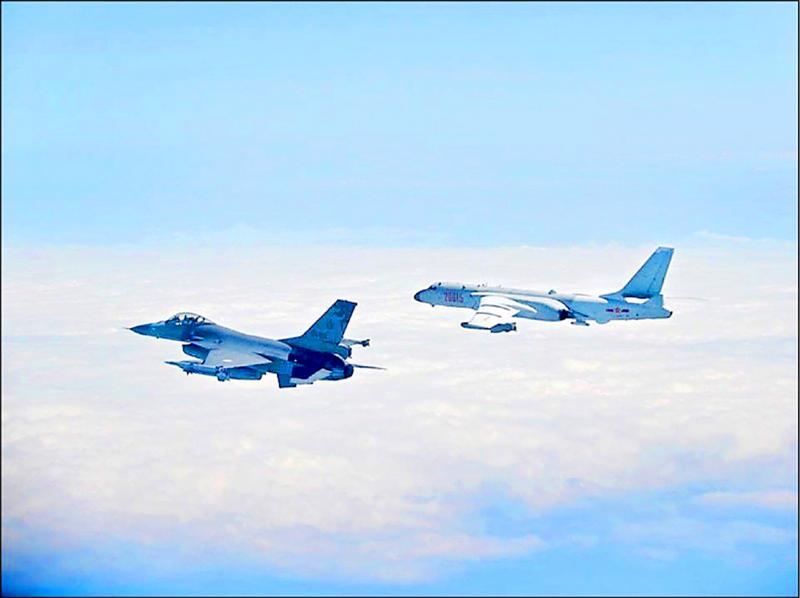The military must adjust its strategies as the methods of the Chinese People’s Liberation Army (PLA) Air Force undergo a qualitative shift, retired Republic of China Air Force deputy commander Chang Yen-ting (張延廷) said on Saturday.
Over the past few months, there have been frequent sightings of Chinese military aircraft near Taiwan and Ministry of National Defense data shows that an incursion on Aug. 10 was the third time since March last year that PLA aircraft had crossed the median line of the Taiwan Strait.
Military tensions between China and the US in the Strait and the South and East China seas are continuing to escalate, while tensions between Taiwan and China have become a norm, Chang said, adding that both situations increase the likelihood of triggering a flashpoint in the region.

Photo courtesy of Ministry of National Defense
The Taiwanese military considers the air space encompassing the 12 nautical miles (22.2km) from the coast of Taiwan to the median line as the “inception zone,” where it monitors aircraft, broadcasts messages to chase any that enter out and can order surface-to-air missile units to be placed on standby if needed, Chang said.
However, the emergency scrambling of Taiwanese fighters is starting to have an effect on equipment maintenance and pilot fatigue, and the military must make adjustments to its standing systems, he added.
“We cannot be led about by the nose by the enemy,” Chang said.
One of the China’s common methods to test Taiwanese reaction speed and capability is to perform military exercises west of the median line before sending aircraft across it, he said.
“We must take notice and come up with a way to react and counter their probing efforts,” he said.
Should the international community become used to China’s attempt to show its sovereignty over the region, it could become easy for them to misperceive the Strait and nearby area as Chinese territory, he said.
The military must prevent China from using its strategies of unrestricted warfare, or precision or decapitation strikes, in or near the Strait, Chang said.
The air force has many weaknesses it must address, he said, citing its mainstay fighters, which are parked in open hangars.
“The forces committed to the defense of airfields is spread too thin over a wide area,” he said, adding that compared to Israel, Taiwan’s airfields are lightly guarded.
If China were to target the eight main strategic airfields with fast-strike units, such as people on motorcycles with grenades at times when defense is lax, it would be easy to wipe out Taiwan’s main combat jets, Chang said.
Without air superiority, Taiwan would be forced to cede the skies to China, which would spell a different outcome should hostilities across the Strait resume, he said.
Chang’s comments follow media reports that cited a former military instructor, who was not named, as saying that should Taiwan lose air superiority, the nation’s defenses would not last 48 hours.
The Air Force Command Headquarters on Saturday said that anti-air units are deployed near strategic targets and it has stepped up anti-air defense capabilities.
It said that Taiwanese can rest assured, as the air force has contingency plans to allow it to “swiftly recuperate and regain combat capabilities” should airfields be damaged.

The manufacture of the remaining 28 M1A2T Abrams tanks Taiwan purchased from the US has recently been completed, and they are expected to be delivered within the next one to two months, a source said yesterday. The Ministry of National Defense is arranging cargo ships to transport the tanks to Taiwan as soon as possible, said the source, who is familiar with the matter. The estimated arrival time ranges from late this month to early next month, the source said. The 28 Abrams tanks make up the third and final batch of a total of 108 tanks, valued at about NT$40.5 billion

Two Taiwanese prosecutors were questioned by Chinese security personnel at their hotel during a trip to China’s Henan Province this month, the Mainland Affairs Council (MAC) said yesterday. The officers had personal information on the prosecutors, including “when they were assigned to their posts, their work locations and job titles,” MAC Deputy Minister and spokesman Liang Wen-chieh (梁文傑) said. On top of asking about their agencies and positions, the officers also questioned the prosecutors about the Cross-Strait Joint Crime-Fighting and Judicial Mutual Assistance Agreement, a pact that serves as the framework for Taiwan-China cooperation on combating crime and providing judicial assistance, Liang

A group from the Taiwanese Designers in Australia association yesterday represented Taiwan at the Midsumma Pride March in Melbourne. The march, held in the St. Kilda suburb, is the city’s largest LGBTQIA+ parade and the flagship event of the annual Midsumma Festival. It attracted more than 45,000 spectators who supported the 400 groups and 10,000 marchers that participated this year, the association said. Taiwanese Designers said they organized a team to march for Taiwan this year, joining politicians, government agencies, professionals and community organizations in showing support for LGBTQIA+ people and diverse communities. As the first country in Asia to legalize same-sex

MOTIVES QUESTIONED The PLA considers Xi’s policies toward Taiwan to be driven by personal considerations rather than military assessment, the Epoch Times reports Chinese President Xi Jinping’s (習近平) latest purge of the Chinese People’s Liberation Army (PLA) leadership might have been prompted by the military’s opposition to plans of invading Taiwan, the Epoch Times said. The Chinese military opposes waging war against Taiwan by a large consensus, putting it at odds with Xi’s vision, the Falun Gong-affiliated daily said in a report on Thursday, citing anonymous sources with insight into the PLA’s inner workings. The opposition is not the opinion of a few generals, but a widely shared view among the PLA cadre, the Epoch Times cited them as saying. “Chinese forces know full well that